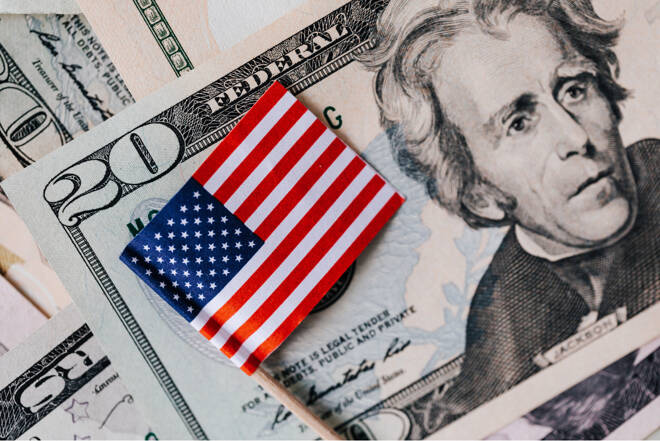Advertisement
Advertisement
US Dollar Index (DXY) News: Dollar Weakens as Fed Rate Cuts Anticipated
By:
Key Points:
- Fed Chair Powell’s Jackson Hole speech reinforced market beliefs that interest rate cuts are imminent, weakening the dollar.
- The U.S. dollar slumped to a three-week low against the yen, reflecting growing expectations of Fed rate cuts in September.
- Traders now see a 64% chance of a 25-basis-point Fed rate cut in September, with a 36% likelihood of a more aggressive cut.
Dollar Weakens Amid Prospects of Fed Rate Cuts
The U.S. dollar experienced notable weakness on Monday, sliding to a three-week low against the yen and hovering near multi-month lows against the euro and sterling. This decline comes as investors increasingly anticipate that the Federal Reserve may soon initiate a series of interest rate cuts, a shift in monetary policy that could impact global currency markets.
At 14:23 GMT, the U.S. Dollar Index is trading 100.816, up 0.135 or +0.13%.
Dollar Slips Against Yen, Stabilizes Elsewhere
On Monday, the dollar dropped as much as 0.7% to 143.45 yen, marking its weakest level since early August. The yen’s strength was further bolstered by comments from Bank of Japan Governor Kazuo Ueda, who reaffirmed his commitment to raising interest rates if inflation continues to meet the 2% target. This stance contrasts with expectations for dovish policy from the Federal Reserve, adding to the yen’s appeal.
The dollar also saw some stabilization against the euro and sterling after touching new lows last week. The euro was slightly weaker at $1.1180, just off its recent high of $1.1205, while sterling eased to $1.3199 after hitting a 17-month high on Friday. Market participants are closely watching the potential fallout from escalating tensions in the Middle East, which could further influence currency movements.
Powell’s Comments Signal Imminent Rate Cuts
Federal Reserve Chair Jerome Powell’s speech at the Jackson Hole economic symposium on Friday was a key factor in the dollar’s recent performance. Powell did not announce any new policies but confirmed market expectations for upcoming rate cuts, suggesting that further cooling in the job market would be undesirable. Traders now overwhelmingly expect the Fed to begin its rate-cutting cycle on September 18, with a 64% probability of a 25-basis-point cut and a 36% chance of a more aggressive 50-basis-point reduction.
Impact on Gold and Treasury Yields
The prospect of lower interest rates has also supported gold prices, which remain near record highs. A weaker dollar, coupled with Powell’s dovish remarks, has made gold more attractive to investors, especially in a low-yield environment. Additionally, the yield on the 10-year U.S. Treasury note continued its downward trend, slipping 3 basis points to 3.778%, reflecting market expectations for easing monetary policy.
Market Forecast: Continued Dollar Weakness
Looking ahead, the U.S. dollar is likely to face further pressure as the market fully prices in the anticipated rate cuts. While there may be some stabilization in the short term, particularly against currencies with less aggressive monetary policies like the euro and sterling, the yen is expected to remain firm due to Japan’s contrasting rate outlook. Gold is also poised to benefit from the softer dollar and declining yields, with potential for further gains if central banks continue their gold purchases. Traders should prepare for a volatile period as the Fed’s September meeting approaches, with significant implications for currency and commodity markets.
Technical Analysis
The U.S. Dollar Index (DXY) is currently straddling the December 28 bottom at 100.617. Strong downside momentum could push the market on the weak side of this level, putting the June 14, 2023 bottom at 99.578 on the radar.
Although the market looks ripe for a counter-trend reversal, traders should treat this move as a selling opportunity since the fundamentals are decisively bearish.
About the Author
James Hyerczykauthor
James Hyerczyk is a U.S. based seasoned technical analyst and educator with over 40 years of experience in market analysis and trading, specializing in chart patterns and price movement. He is the author of two books on technical analysis and has a background in both futures and stock markets.
Advertisement
